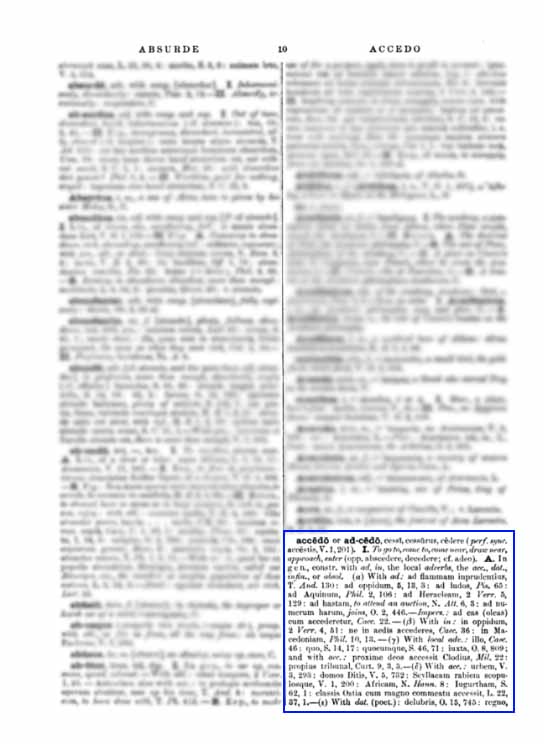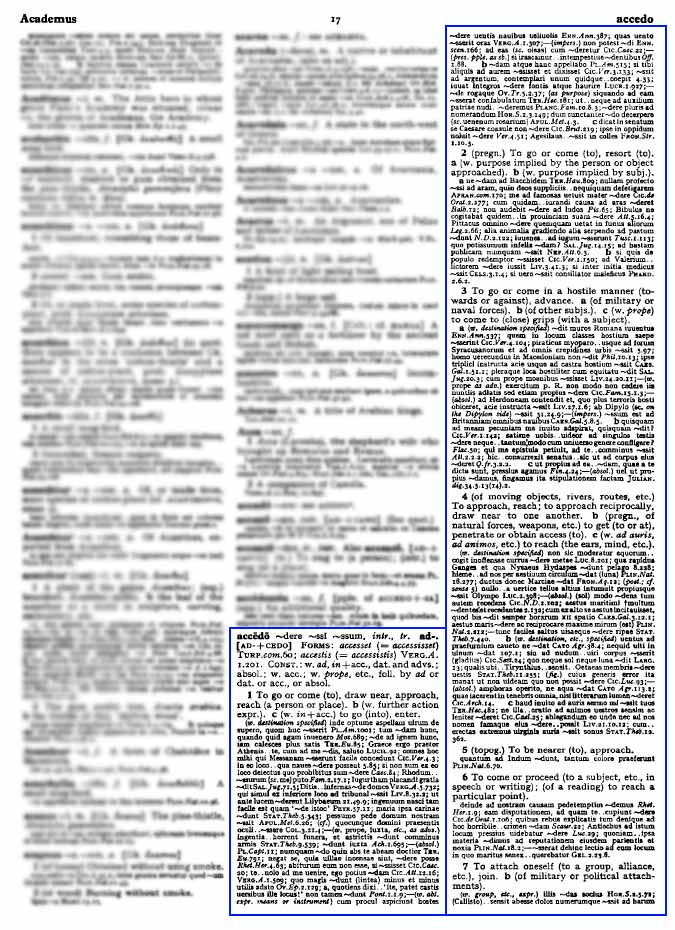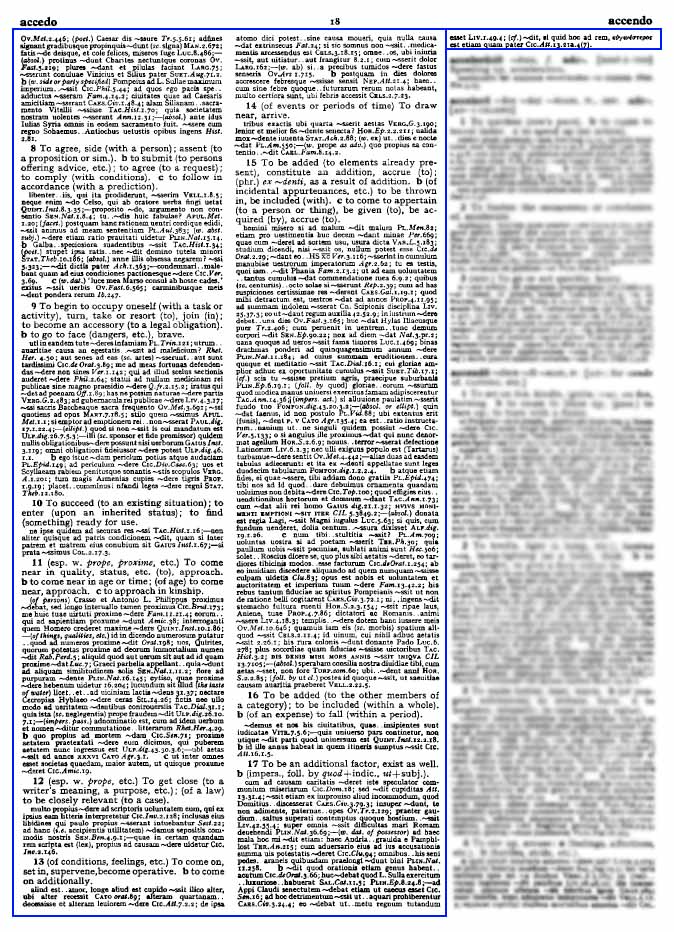Contents
What is the best Latin dictionary? There is no “best” dictionary because it depends on your needs. In this article we’ll examine six popular dictionaries, so that you can make an informed decision when getting a dictionary. The focus here is on dictionaries for reading Latin produced during antiquity.
The best Latin-English dictionary for beginners, and people with a casual interest in Latin, is The Bantam New College Latin & English Dictionary. For intermediate to advanced readers, both Cassell’s Standard Latin Dictionary and Chambers Murray Latin-English Dictionary are excellent choices. For more advanced students and scholars, the standard lexicons are Lewis & Short and Oxford Latin Dictionary.
That’s the short answer, but there are many things to consider when deciding on a dictionary, so you don’t get the wrong one. In this article, we’ll discuss all you need to know to make an informed choice, and we will compare entries from various dictionaries.
Let’s begin.
What do you need from a Latin Dictionary?
Before deciding on a dictionary, you have to know what you want to use it for. Latin-English dictionaries differ widely and are written for very different audiences. It’s important that you choose one suited for your needs.
If you are in school, your teacher may want you to use a particular one. Ask for suggestions. Sometimes, you might not even need a dictionary, for instance if you are using a textbook with a full glossary.
If you decide you need a Latin dictionary, here are four things to consider:
- Contents
- Size
- Time period
- Comprehensiveness
Contents: Do you want more than just definitions?
Many English-Latin dictionaries contain much more than English definitions of Latin words. Some also have an English-Latin section, sections on pronunciation, conjugations and declinations, Roman history, poetry, etc. Ask yourself what you think you will need. Remember that you can also find conjugations, declinations, and pronunciation in any Latin grammar. However, if you are still unsure of the forms, it might be practical to have them in the dictionary.
Suggested reading: How to Learn and Memorize Latin Declensions (and conjugations)
Size: How many words do you need your Latin dictionary to have?
Some dictionaries have 40’000 words and phrases, while others aim to contain all attested words from the literature of a certain period. If you want to look up rare or a wide variety of words, make sure your dictionary is a large one!
Note that if you want to look up specialized terminology, e.g., botanical terms, make sure to find a dictionary specialized in that area or one with modern Latin terminology. Most Latin dictionaries are written for readers of classical Latin and, in some cases, medieval and neo-Latin.
Time period: What period of Latin are you reading?
Most Latin dictionaries specialize in the usage of a particular period. This is natural since Latin was used in many domains not only by the Romans but during the Middle Ages and beyond. One dictionary might contain words from, e.g., 200 B.C. to 100 A.D., while another might cover the words up to 400 A.D.
Level of Detail: What information do you want?
This is the most important question. Some dictionaries only give you the English definition, while others also provide examples and notes on how the word is used. The most comprehensive dictionaries will show how the usage and meaning of the word are different depending on, e.g., genre, author, and time periods. So ask yourself:
- Do you want to look up a word to get a general idea of its meaning?
- Do you want to get an in-depth understanding of the usage and various meanings?
Note! If you are translating to or from Latin, use a dictionary that is rich with examples and notes on usage so you can find the right definition.
Additional things to consider: paper vs digital
You might also consider if you want a paper or a digital dictionary. Paper dictionaries may have their charm–and weight–but digital ones are superior in speed. If readability is a concern for you, note that most dictionaries have a rather small font size, while a digital one can usually be adapted to the user’s needs.
Now, it might seem like I am against paper dictionaries. Far from it, I love them. Furthermore, most Latin dictionaries exist only in paper format. So, if you decide you need a digital one, your options are much fewer.
Six popular dictionaries
Now that you know what you need the dictionary for, let’s consider some popular and often recommended Latin dictionaries. Since no dictionary fits everyone, we will look at dictionaries geared towards different audiences.
- Collins Latin dictionary
- Bantams New College Dictionary
- Cassell’s Standard Latin Dictionary
- The Bantam New College Latin & English Dictionary
- Lewis & Short
- Oxford Latin Dictionary
I have divided these dictionaries into three categories termed tier 1, tier 2, and tier 3.
- Tier I are smaller dictionaries that provide only the most rudimentary information, e.g., English definitions of a Latin word with no examples from Latin literature. They usually have an English-Latin section and additional sections on grammar, history, etc.
- Tier 2 are medium-sized dictionaries that provide the English definitions and examples of usage taken from Latin literature.
- Tier 3 are the largest Latin-English dictionaries and contain most or all attested words during a particular time period and give comprehensive information on meanings across time and genres with ample examples and notes on usage.
Pros, cons, and recommendations
For each dictionary we’ll give a brief overview of its contents, before considering the pros and cons and what purpose it might serve. In all dictionaries, we will look up the same word so that you can get a better idea of what information they provide and how it is presented. Finally, I will give my thoughts on whether a certain dictionary is worth getting or not.
Note! Dictionaries are like shoes, you use them a lot. So, before you make up your mind, preview the dictionary, and look up a few words.
Tier 1: Basic–intermediate dictionaries
These are all-in-one dictionaries with no or very limited information on word usage.
Collins Latin Dictionary: Dictionary & Grammar
- 640 pages
- Basic English definitions
- Latin-English
- English-Latin
- Additional sections
- App version
This dictionary is only on this list because it is often recommended to beginners. Collins Latin Dictionary is a basic Latin dictionary, with ca. 47’000 thousand Latin headwords. Like many smaller dictionaries geared towards schools and beginners, Collins has a Latin-English, an English-Latin section, and a basic grammar section, including tables of declensions and conjugations. There is an app version of this dictionary-making queries much more efficient.
When it comes to the dictionary entries themselves, they are, of course, very limited, mostly giving basic information on declination, conjugation, and parts of speech together with English definitions.
Sample entry
Below is a sample entry of the verb accedo from Collins Latin Dictionary:
What is the verdict?
It’s an elementary Latin dictionary that aims to be an all-in-one resource for students. It does the job of presenting lists of words with definitions. However, one thing I don’t like is that only the masculine form of adjectives is listed, e.g., Absonus and acclivis, instead of absonus, ‑a, ‑um, or acclivis, ‑is, ‑e. Furthermore, even for a basic dictionary, I would like to see some more information on usage, but maybe that’s just me.
So if you only want to look up common Latin words and get a simple definition in English, it might suffice. But I would not recommend it. I would rather suggest you get a slightly larger dictionary with many of the same features, which still avoids being overwhelming.
If you want a large number or headwords with notes and examples of usage, this is definitely not the Latin dictionary for you.
The Bantam New College Latin & English Dictionary by John Traupman
Overview
- 708 pages
- Latin-English
- English-Latin
- Notes on constructions
- Section on basic grammar
- Historical, geographical, mythological names
The Bantam New College Latin & English Dictionary is a popular dictionary with over 200 ratings on Amazon. It’s a medium sized dictionary with 70’000 words and phrases, and, like Collins, has additional sections that might be of interest to beginners (e.g. pronunciation, grammar, history, mythology). In addition it also has an English-Latin section. Bantam stands out with some interesting additions, such as slang and vulgar expressions and neo-Latin vocabulary.
Sample entry.
Below is the entire entry for the Latin verb accedo in the Bantam New College Latin & English Dictionary:
Verdict
This is a great dictionary for anyone starting out or with a casual interest in Latin. It has rather succinct articles giving the English definition and a note on various constructions of the word (e.g. if it is used with the dative or accusative). A welcome addition to a basic dictionary is the addition of later Latin and neo-latin! Latin is indeed more than just Cicero and Vergil!
Like Collins, Bantham’s is more than just a Latin-English dictionary, with an English-Latin dictionary and sections on grammar and history.
For anyone wanting to read literature or use Latin actively, I think the lack of examples from literature and limited info on constructions makes this less than ideal.
If, however, you want a good all-in-one resource, and be able to look up a word and get a general idea of its meaning, I would absolutely recommend this dictionary.
Tier 2: Intermediate-Advanced Dictionaries
We now come to the next tier of Latin lexicons. Here we are looking at dictionaries with examples of usage taken from Latin literature.
Cassell’s (standard) Latin Dictionary
- 883 pages
- Latin-English
- English-Latin
- Examples from Latin literature
- Sections with idiomatic expressions
Cassell’s Latin Dictionary is another very popular dictionary with over 100 reviews on Amazon and an average of 4.5 stars.
It is a rather comprehensive Latin dictionary, but what sets this apart from Collins and the Bantam New College Latin Dictionary are the many examples of usage taken from Latin literature. This is a key resource for understanding how Latin words are used and change meaning in various contexts. Like the previous dictionaries, this too has an English-Latin section.
I especially like the separate section in the entries where idiomatic expressions containing the headword are presented.
Cons.
While the Bantam dictionary contains a welcome addition of late and neo-Latin words, Cassells covers only the period of 200 B.C. to 100 A.D. Another drawback is that the full source is not given for examples, only the author’s name! Let’s look up the word accessio:
We see an example suis accessionibus from Cicero since it says Cic. But it does not say where in his vast body of work the expression occurs. So if we want to look at the context to really understand how to use it, we have to search using a Latin corpus. (It’s from Cicero’s second speech against Verres (2.2).)
Sample entry
Below is a sample entry of the verb accedo from Cassell’s Latin Dictionary:
What’s the verdict?
If you are studying Latin and reading Classical texts beyond a few sentences here and there, it is an excellent dictionary. It gives most of what you need without being (too) overwhelming: a variety of English definitions with notes on constructions and examples of usage from Latin literature.
In addition to being a rather comprehensive Latin-English dictionary, it also has a section for translating from English into Latin. For advanced Latin composition, however, you would need to use a dedicated English-Latin dictionary such as Smith-Hall.
As you advance in your studies, I recommend you start using either Lewis & Short or the Oxford Latin Dictionary in conjunction with this. (See below.)
Chambers Murray Latin-English Dictionary
- 832 pages
- Latin-English dictionary
- Includes some later latin
- Notes on usage
- Examples from Latin literature
Chambers Murray Latin-English Dictionary is another commonly recommended dictionary. It is very similar to Cassells but is more comprehensive, covering a somewhat longer time period (ca. 200 B.C.–200 A.D. with some later authors, e.g., Claudianus and Ausonius.) Like Cassell’s, this dictionary gives examples from Latin literature and some notes on usage.
Cons.
The major drawback of this dictionary, like Cassell’s, is that it does not give full sources for the quotes from Latin authors.
Sample entry
Verdict
As Cassells, this is an excellent dictionary for reading classical Latin and would suffice for most intermediate to advanced students.
I lean towards Cassell’s due to the English-Latin section and the collection of idiomatic expressions in the articles. However, if you want to read anything beyond classical Latin, Chambers-Murray is a better choice since it includes later authors.
I would, however, suggest that students start using Lewis & Short as well, to get used to sorting through the longer entries. This is the first dictionary thus far that does not have an English-Latin dictionary.
Tier 3: Advanced and Scholarly Dictionaries
Now we turn to the most comprehensive Latin-English dictionaries. These are written for advanced students and scholars and are comprehensive.
Lewis & Short
- 2019 pages
- Latin-English
- 2nd century B.C. –8th century A.D.
- Examples from literature
- Notes on usage and etymology
Lewis & Short is, without a doubt, the most commonly used Latin dictionary for learners and scholars out there. This is because it is one of the most comprehensive Latin dictionaries covering classical Latin and much later writers. It is also freely available online.
Lewis & Short was published in 1879 under the title Harper’s Latin Dictionary. It was based on the translation of the German dictionary Wörterbuch der Lateinischen Sprache. Although it has been criticized throughout the years for slight inaccuracies, both regarding definitions and, more particularly, vowel quantities, it is still the standard dictionary used by scholars today.
Sample entry from Lewis & Short
Let’s look up accedo in Lewis & Short as well:
As you can see, the entries are very dense, but very comprehensive.
Verdict
Lewis & Short is a vast dictionary covering writers from 200 B.C. to 800 A.D. It gives ample notes and examples of usage, giving the reader a clear sense of a particular word’s meaning and, sometimes, even register.
One of the criticisms levied against it is its rather dense and confusing disposition, which takes quite some time to get used to. Nevertheless, for most advanced study and research, it is the only Latin dictionary you’ll need
Oxford Latin Dictionary
- 2400 pages
- Ca. 200 B.C. to 200 A.D.
- Latin-English
- Examples from literature
- Based on modern editions
- Notes on usage and etymology
Note! This dictionary should not be confused with the Oxford Latin desk dictionary.
The Oxford Latin Dictionary was commissioned at the start of the 20th century to replace the aging Lewis & Short. It can hardly be said to have succeeded in that endeavour.
It stands apart from Lewis & Short in that it is not based on previous dictionaries but is a new work relying on newer editions and readings of texts.
Together with its elder foe Lewis & Short, the OLD is a standard for advanced students and scholars of Latin. However, it’s an enormous work of 2400 pages, covering Latin up to 200 A.D., excluding most Christian writers.
Its articles are very comprehensive with many examples. One strength lies in the clear disposition of articles making finding the relevant sense comparatively easy for the reader. The OLD is also a rather new dictionary (1968–88), using modern readings and editions of texts, thus considering much of the research done since the publication of Lewis and Short at the end of the 19th century.
This also means that the English used in the definitions is modern, eliminating the risk of misinterpreting the definition due to semantic drift since 19th century.
Sample entry from Oxford Latin Dictionary
Here is the entry for accedo:
As you can see from the image above, the entries are vast. They provide countless examples of usage across genres and time.
What’s the verdict?
If you are an advanced learner and want to dive deep into the different nuances and usages of words, it is a great resource. This is, however, by no means a perfect dictionary. The major drawback is the limited time period of the dictionary and the hefty price tag of $300–400. Furthermore, the absence of information regarding ante classical, classical, and post-classical usage is unfortunate. This is in stark contrast to Lewis & Short, where you will often find this type of information. The strength of OLD is its clear layout and modern readings and definitions, which makes this dictionary very readable and not only consultable.
It is judicial to use the OLD in conjunction with Lewis & Short to give you more examples and more information on the usage of a particular word.
Conclusion
We’ve looked at three types of dictionaries, from the very basic to the most comprehensive. Some are suitable for beginners or people with a casual interest in Latin, while others are suitable for intermediate students, and yet others for advanced students and scholars. Bantams New College Dictionary, Cassell’s Latin Dictionary, Chambers Murray, Lewis & Short, and OLD are all great dictionaries. They can all be the best dictionary, depending on the situation.
In the end, the best dictionary is the one that will meet your needs, that you like and that you will actually use. If you plan to do your studying on the subway, the OLD with its 2400 pages might get left at home.
Additional Latin Dictionaries
What dictionaries are there for medieval and neo-Latin?
First, there is the “supplement” to OLD covering late antiquity up to 600 A.D., A. Souter, A Glossary of Later Latin to 600 A.D. (1949). Next is the standard dictionary for medieval Latin Ducange Glossarium ad scriptores mediae et infimae Latinitatis (Niort 1883–87), which is freely available online. For Renaissance Latin there is R. Hoven, Lexique de la Prose Latine de la Renaissance (Leiden 1994).
Which is the best English-Latin Dictionary for translating into Latin?
One of the best and most comprehensive is Smith & Hall’s English-Latin Dictionary, freely available online here at Latinitium.com. Although they are very detailed, I would suggest you consult dictionaries of Latin synonyms to know which word is suitable for which context. You can find a guide to the best dictionaries of Latin synonyms here.
What monolingual Latin-Latin dictionaries are there?
Totius Latinitatis Lexicon (Forcellini) and Thesaurus Linguae Latinae (TLL). Forcellini is a centuries’ old classic with definitions in a clear Latin style. Forcellini is a great resource (available here), but due to its age, it relies on old editions and readings of texts. TLL is set to be the largest Latin dictionary ever created. Begun in the 19th century, it is not yet finished. Like Forcellini, it is entirely in Latin.
This is the best resource for getting a deep and chronological understanding for the meaning and usage of words. As of 2019 the Thesaurus Linguae Latinae is freely available online!
*This article contains affiliate links, which means that we make a small commission from any sales—without affecting the price for you.


























